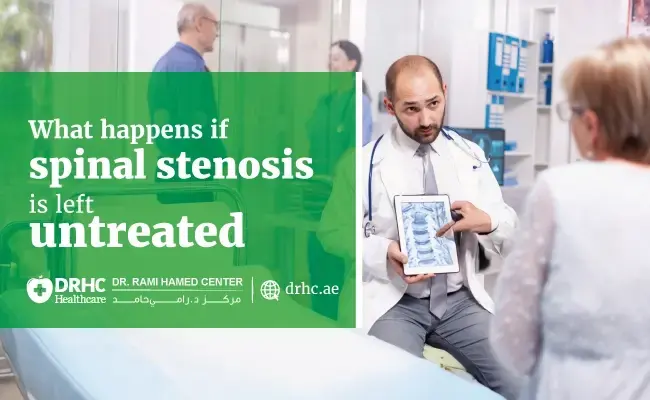
If you've ever felt a sudden, sharp pain that begins in your lower back and shoots down your leg, you may be experiencing sciatica—a common and often painful condition. While the name might sound serious, understanding its root cause can offer both clarity and hope for relief.
One of the most frequent causes of sciatica is a herniated disc in the lower spine. At the Dr. Rami Hamed Center (DRHC) in Dubai, we often see patients worried about why their leg hurts when the problem seems to be in their back. In this blog, we’ll explain how a herniated disc can trigger sciatica, what symptoms to watch for, and how we can help you feel better, without jumping straight to surgery.
What Is a Herniated Disc?
Your spine is made up of bones (vertebrae) cushioned by intervertebral discs, which act like shock absorbers. These discs have a soft center (nucleus) and a tough outer layer (annulus). When the outer layer becomes weak or damaged, the inner material can bulge or leak out—this is called a herniated disc.
Herniated discs are most common in the lower back (lumbar spine), where pressure and movement are greatest.
How a Herniated Disc Causes Sciatica
Running from your lower back down to your feet, the sciatic nerve is the longest and thickest nerve in your body. When a herniated disc presses on this nerve—especially where it exits the spine—it can cause sciatica.
This pressure triggers symptoms like:
- Sharp or burning pain that radiates from the lower back into the buttocks, thigh, and leg
- Numbness or tingling in the leg or foot
- Muscle weakness in the affected leg
- Difficulty standing or walking due to pain
Sciatica typically affects one side of the body, depending on which nerve root is compressed.
What Increases the Risk?
Several factors can increase your risk of a herniated disc and subsequent sciatica:
- Age-related disc degeneration
- Poor posture or prolonged sitting
- Repetitive lifting or twisting motions
- Obesity, which puts extra pressure on the spine
- Sedentary lifestyle
Understanding these risk factors can help you make lifestyle adjustments to protect your spine.
How Is Sciatica Diagnosed?
At DRHC Dubai, our spine specialists start with a comprehensive evaluation, which includes:
- A detailed medical history
- A physical exam focusing on strength, reflexes, and nerve response
- Imaging tests like MRI or CT scans to confirm the presence and location of a herniated disc
These steps help us pinpoint the exact cause of your symptoms and rule out other conditions.
Treatment Options for Herniated Disc and Sciatica
The good news: Most people do not need surgery. Many cases improve with conservative treatments such as:
- Medications
Anti-inflammatory drugs and muscle relaxants can reduce pain and inflammation. - Physical Therapy
Customized exercises strengthen the spine, improve flexibility, and relieve nerve pressure. - Epidural Steroid Injections
In certain cases, injections can reduce inflammation around the affected nerve and offer temporary relief. - Lifestyle Changes
Weight management, ergonomic changes at work, and regular movement can support long-term recovery.
When Is Surgery Needed?
If symptoms persist after several weeks of non-surgical care—or if you experience significant weakness, loss of bowel/bladder control, or disabling pain—surgical intervention may be considered.
Procedures like a microdiscectomy (removal of the herniated portion of the disc) can relieve nerve pressure with a high rate of success and often require only a short hospital stay. At DRHC Dubai, we offer minimally invasive surgical options to ensure faster recovery and lower risk.
Explore Our Related Blogs
- Understanding Endoscopic Spinal Decompression: Who It Helps
- What to Expect During Recovery from Endoscopic Spine Surgery
- Who Is a Candidate for Minimally Invasive Spinal Surgery?
- How spine surgery relieves nerve compression and restores function
FAQs: What Patients Commonly Ask
Is sciatica permanent?
No. With the right treatment and self-care, most people recover fully from sciatica within weeks to months.
Will a herniated disc heal on its own?
In many cases, yes. The body can reabsorb part of the herniated disc over time, reducing pressure on the nerve.
Can I prevent future episodes?
Absolutely. Regular exercise, good posture, maintaining a healthy weight, and using proper body mechanics can greatly reduce your risk.
Is walking good for sciatica?
Yes—gentle walking can help ease symptoms. However, avoid prolonged sitting and high-impact activities during flare-ups.
Conclusion: Relief Is Possible—and Within Reach in Dubai
Sciatica caused by a herniated disc can be distressing, but it’s treatable—and often without surgery. If you’re dealing with radiating leg pain or back discomfort that doesn’t go away, it’s important not to ignore it.
At the Dr. Rami Hamed Center in Dubai, our experienced team of orthopedic and spine specialists will guide you through a thorough evaluation and a personalized treatment plan to help you return to a pain-free life.
Consultations and treatments are available at DRHC Dubai. Don’t wait for the pain to worsen—book an appointment today and take the first step toward recovery.
Dr. Rami Hamed
Consultant Spine & Orthopedic Surgeon
Founder, DRHC – Dubai Healthcare City
📞 +971 4 279 8800
🌐 www.drhc.ae
📍 Dubai Healthcare City, Building 52
Topic: orthopedic Spine Surgery




.jpg)




Leave a comment